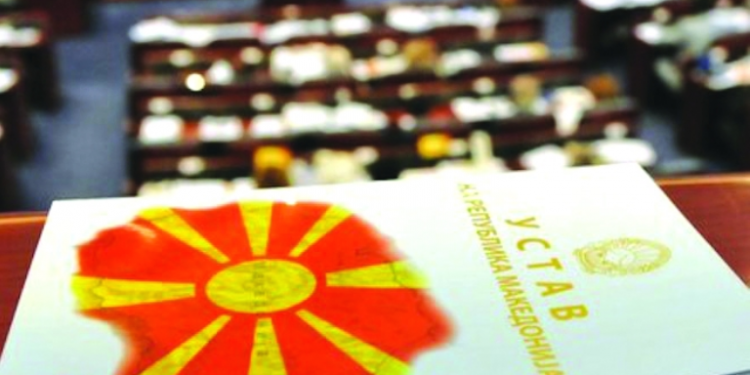The Macedonian Constitution as the highest legal act of the country has so far undergone eight amendments. The last one was in 2019 when the Assembly with 81 votes “for” voted the four constitutional amendments to change the constitutional name from the Republic of Macedonia to the Republic of Northern Macedonia after the entry into force of the Prespa Agreement. The Assembly also adopted the Constitutional Law on the Implementation of Amendments.
Previously, amendments to the Constitution were made in 1992, 1998, 2001, 2003, 2005, 2009 and 2011.
The first amendments to the Constitution were adopted on 6 January 1992 with the adoption of Amendments I and II. They establish that the state has no territorial claims to neighboring states and will not interfere in the sovereign rights and internal affairs of other states.
Amendment III was adopted on 1 July 1998, at the initiative of the Supreme Court, and extended the maximum period of detention until indictment, from 90 to 180 days from the date of detention.
At the session of the Assembly on November 16, 2001, the Members of Parliament adopted the amendments IV, V, VI, VII, VIII, IX, X, XI, XII, XIII, XIV, XV, XVI, XVII and XVIII. These amendments were adopted as an obligation under the Ohrid Framework Agreement. The Preamble of the Constitution, which is written in one paragraph, has been replaced. The issue of the use of the official language and its alphabet on the entire territory of the country and in the local self-government units is regulated in a completely new way. A new fundamental value has been introduced in the constitutional order of the state, ie adequate and equitable representation of the citizens from other communities in the state government bodies and other public institutions at all levels. The list of religious communities set out in the 1991 Constitution has been expanded. The rights of ethnic minorities are regulated. The protection, promotion and enrichment of the historical and artistic wealth of the state and all the communities in it are guaranteed. It is envisaged that for laws that directly affect culture, the use of languages, education, personal documents and the use of symbols, the Assembly decides by a majority vote of the MPs present, where there must be a majority vote of the MPs present belonging to communities that are not majority in the state. The manner of election (double majority) and the competencies of the Ombudsman are regulated. The Committee for Inter-Community Relations established by the Assembly has been introduced and its composition has been determined. The representation of the members of the minority communities in the Republic Judicial Council, the Constitutional Court and the Security Council is regulated. The issue of the adoption of laws in the field of local self-government is regulated (double majority of votes), as well as the competencies of the local self-government units. The procedure for making the decision to amend the Constitution of the Republic of Macedonia is regulated. According to the last amendment, the preamble, the articles on local self-government, Article 131, ie the decision to amend the Constitution, as well as the articles that regulate the fundamental values, the right to equality, as well as the rights of minority communities and the decision to add a new provision. which refers to the subject of those provisions or articles, may not be changed without a two-thirds majority vote of the total number of Members of Parliament, in which there must be a majority vote of the total number of Members of Parliament belonging to non-majority communities in the Republic of Macedonia.
On December 26, 2003, lawmakers adopted Amendment XIX, which regulates the derogation from the inviolability of secrecy of all other forms of communication, not just letters, as established by the 1991 Constitution. It has been determined that the deviation is made on the basis of a court decision, under conditions and procedure determined by law, and due to precisely stated reasons.
Amendments XX, XXI, XXII, XXIII, XXIV, XXV, XXVI, XXVII, XXVIII, XXIX AND XXX The Assembly adopted them at the session held on December 7, 2005. They refer to the reforms of the judicial system, ie the change in the organization of the judicial system, the election of judges and the public prosecutor’s office. The immunity of the ministers is lifted, and only the immunity of the Prime Minister is retained, with the Parliament deciding on the revocation of his immunity, and not the Government as provided by the 1991 Constitution.
At the parliamentary session held on January 9, 2009, Amendment XXXI to the Constitution was adopted, which established the threshold for the election of the President of the Republic in the second round of elections (the candidate who receives the majority of votes from the voters who voted, if elected) will be elected. more than forty percent (40%) of the total number of voters in the Republic).
Amendment XXXII of the Constitution was adopted at the parliamentary session on April 12, 2011, and refers to the impossibility of revoking the citizenship of a citizen of the Republic of Macedonia, ie the impossibility for it to be expelled from the country. A citizen of the Republic of Macedonia may not be extradited to another country, except on the basis of a ratified international agreement and a court decision.
The last constitutional amendments were made on 11 January 2019 when the legislature adopted amendments XXXIII, XXXIV, XXXV, XXXVI to the Constitution which enter into force upon the entry into force of the Final Agreement on the Settlement of Differences Described in Resolutions 817 (1993) and 845 (1993) of the United Nations Security Council, on the termination of the 1995 Interim Accord and on the establishment of a strategic partnership between the Parties and the ratification of the Protocol on Accession to NATO by the First Party to the Final Agreement. They change the name of the country from “Republic of Macedonia” to “Republic of Northern Macedonia”, make changes in the Preamble, guarantee the sovereignty, territorial integrity and political independence of neighboring countries and care for the diaspora.
Practice of constitutional changes in other countries in Europe
Constitutional changes or reforms are a complex and long process. Sometimes change is necessary and essential to improve democratic governance or to adjust to political, economic and social transformations. However, given the fact that the founding of states is enshrined in the constitution itself, amending this important document is a matter of great importance. In some European countries constitutional changes are so common that they occur almost every year, while in others they are very rare.
– In Austria the amendments to the Constitution on an annual basis vary from one to six times (except for the years when there were no changes at all). The Swiss and Belgian constitutions also change quite frequently, and there are more than thirty changes to the Georgian constitution, according to a comparative study by the Parliamentary Institute.
In other countries, however, according to the survey, constitutional changes are very rare.
– In Sweden, the Succession Act which is part of the four fundamental laws of the Constitution has been changed only once. There have been no changes in Romania since 2003. The Spanish constitution has undergone only two changes. Poland’s constitution has also been amended only twice since 1997. In Finland, the Constitution has been amended four times since its entry into force in 2000. The Bulgarian constitution has been amended only five times since 1991. The Greek constitution has undergone four revisions since 1975. Lithuania’s constitution has been amended 1992 times since 10, according to the survey.
The Constitution of the Republic of Northern Macedonia has been amended eight times since 1991. The Parliamentary Institute points out that there are several years in which there is no change at all, but in some years there are changes in over 15 articles of the Constitution.
– The issue of constitutional changes is at the core of constitutional theory and practice. Constitutionalism implies that the fundamental rules for the effective exercise of state power and the protection of individual human rights should be stable and predictable, and not subject to frequent changes, the study said, noting that this is crucial when it comes to the legitimacy of the constitutional system.
Number of amendments to the constitutions of selected countries in Europe
Country Year of adoption of the Constitution Number of constitutional amendments
1 Albania 1998 6
2 Belgium 1831 More than 30 times
3 Bulgaria 1991 5
4 Croatia 1990 5
5 Cyprus 1960 14
6 Czech Republic 1993 8
7 Estonia 1992 5
8 Finland 2000 4
9 France 1958 24
10 Georgia 1995 More than 30 times
11 Germany 1949 64
12 Greece 1975 4
13 Hungary 2011 7
14 Ireland 1937 32
15 Italy 1947 12
16 Latvia 1991 8
17 Lithuania 1992 10
18 Moldova 1994 8
19 Netherlands 1814 More than 40 times
20 Northern Macedonia 1991 8
21 Norway 1814 Relatively common
22 Poland 1997 2
23 Portugal 1976 7
24 Romania 1991 1
25 Slovakia 1992 19
26 Slovenia 1991 10
27 Spain 1978 2
28 Sweden 1974 1
29 Switzerland 1999 44
30 Turkey 1982 19
Source: Parliamentary Institute

















